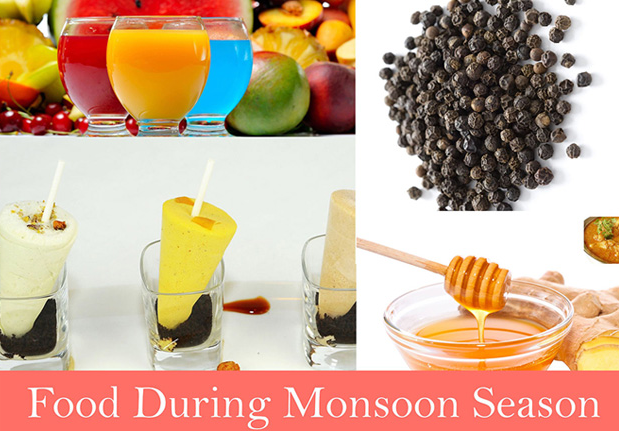
After a blow of hot dry summer months, when the monsoons come in we receive a sigh of relief from scorching heat. While there is cool breeze in the air, our eyes pop out for fried fritters (Pakoras, samosas, kachori). At the same time rains may bring with it a series of infection and occasional flu. It is this time, when people start facing allergy problems, running nose, skin related issue, itchy and watery eyes are few of the allergies heard of during monsoon phase. Damp and filthy conditions in monsoon play a host for many disease-causing germs, which cause serious health issues. Malaria, Typhoid, Hyphae and conjunctivitis are some of the frequent health problems faced by many people. We feel bloated most of the time and always complain of loss of appetite. Water available in the reservoir during monsoon is comparatively heavy to digest and the metabolism is sluggish. Under such circumstances, Ayurveda describes aggravation (vitiation) of vata and accumulation of Pita in rainy days. Space, air, water, fire and earth called the pancha mahabhootas (five primordial elements) from our body and souls, controlling these elements are three doshas – vata (denoting movements), Pitta (denoting transformation) and kapha (denoting stability), which helps maintain equilibrium. The monsoon season sees a rise in vata, which has properties of coolness and lightness. This increase causes dryness in the body and an imbalance in secretion of digestive juices, thereby compromising our metabolism.
Depending upon the constitution of an individual’s body, it may have no effect or as generally observed it can result in everything from joint pain and muscle weakness to flatulence. To control vata as well as combat its effect on our health, Ayurveda recommends that you consume and avoid certain foods.
- Drink warm beverages : add mint or ginger or dry ginger powder to tea.
- Moon dal is easier to digest: Garlic, pepper, ginger, asafoetida, turmeric, coriander and cumin enhances your body’s digestive power and improves immunity.
- Vegetables recommended during rainy days would be okra (bhindi), bottle Guard (dudhi), brinjal (roasted baigan), bitter gourd (kerela). Fruits include Pomegranate, bananas and berries are ideal for monsoon. Include a couple of dates everyday for iron and energy requirements.
- Non vegetarian should include lighter meat preparation like soups and stews Rather than heavy curries.
- Over all astringent, mildly bitter and mildly pungent food work best in Monsoon season. 6. Drink boiled water and its variant.
- Make a ginger paste with a pinch of rock salt, hint of lemon and sugar to taste and eat it before each meal or at least before breakfast. One can also include thin slices of ginger in your meal.
- Rum and sweet red wine are ideal replacements for alcohol like beer & gin.
Finally garlic petals greatly aid digestion and controls vata and dosha.
Food to be Avoided:
- Avoid eating food outside during rainy season. Avoid fish and prawns (sea food) during monsoon, as it is their breeding time.
- Always keep in mind that vegetables you purchase are fresh. It is advisable to buy vegetables for every two days instead of buying for the whole week.
- Fried fritters, be it in any form as pakoras, kachori/samosa, chat, indo-chinese leafy vegetables and sea-food.
- Oils : Heavy oils like mustard and sesame should be avoided during monsoon as they render the body vulnerable to infection. Oils used for cooking during the monsoon season are dry oil like corn or light oils like olive oil.
- Ice from non-distilled water, kulfis and golas should be avoided.
- Juices and cut fruits available at the vendors should be avoided and fruits should be eaten fresh to avoid all kinds of contamination.
- From our toddler days to late teens, we have been instructed by our mothers about the importance of eating green leafy vegetables. But during monsoon season they are best avoided because the dampness, dirt and mud present in the leaves make them susceptible to many germs, leading to different stomach infections.
- Aerated Drinks These drinks reduce minerals in our body, which in turn lead to reduction of enzyme activity. This leads to weak digestive system. Always keep a bottle of water or lemon green tea handy.
- Individuals who suffer with skin allergies during monsoons must avoid spicy Food as this raises body’s temperature and stimulates blood circulation and leads to allergies and skin irritations.
The food aid lifestyle should be such that vata and pita should be well balanced. Following these guidelines help you stay safe and healthy during monsoons. Always binge on nutritional food and be hygienic by taking necessary precautionary measures.
